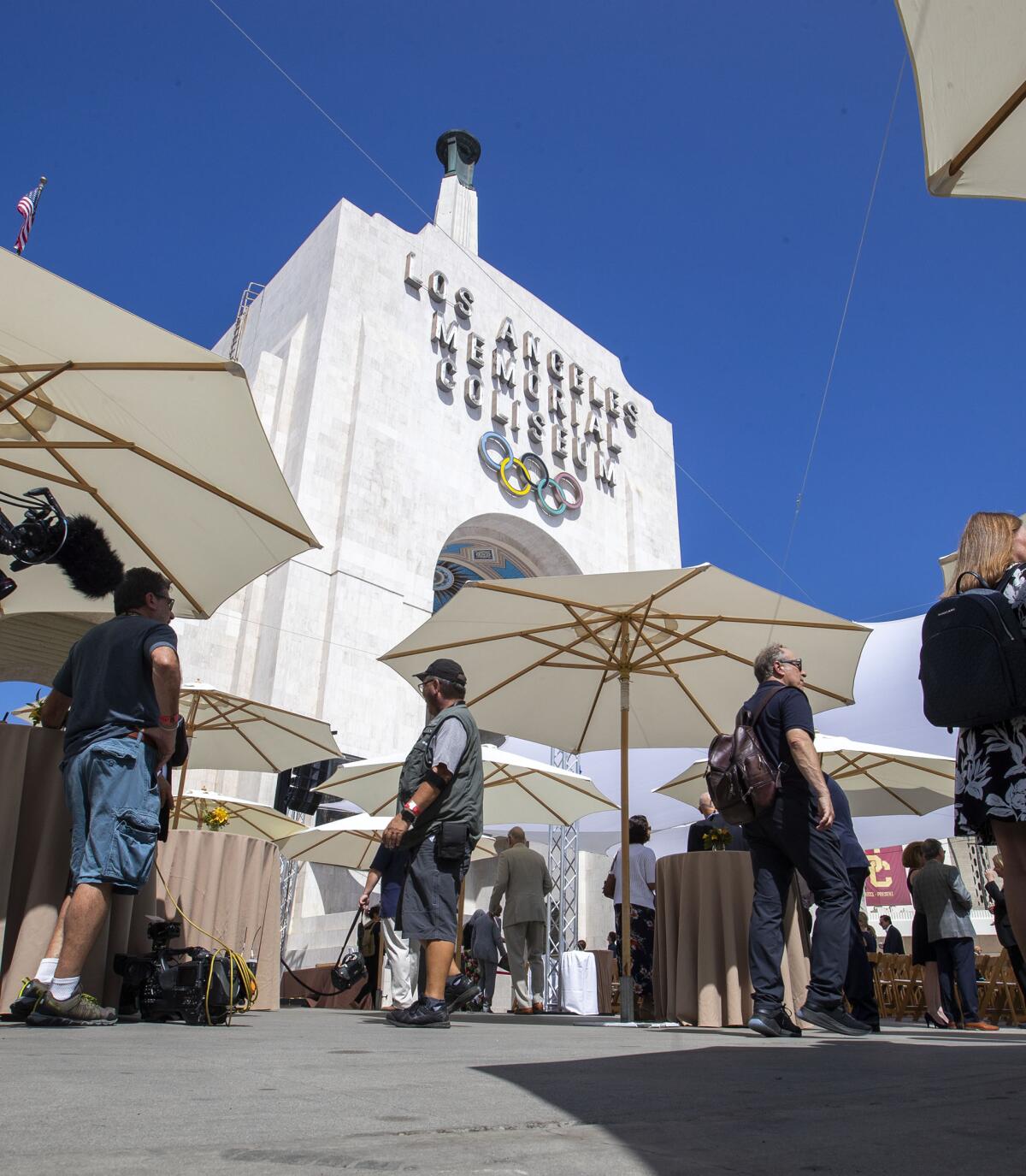L.A. City Council approves agreement with 2028 Olympics organizers

The Los Angeles City Council voted Friday to approve a key contract with the organizers of 2028 Olympic Games that will serve as a blueprint for the city’s responsibilities ahead of the $7-billion sports event.
The council voted 11 to 2 to approve the agreement, with council members Nithya Raman and Mike Bonin opposing it. Councilman Joe Buscaino was absent.
Under the agreement, the city will provide “enhanced resources,” boosting police, fire, sanitation, traffic and parking control services during the 17 days of competition. The contract calls for the city and Olympic organizers to settle on a list of city services and costs by October 2025, with LA28 expected to pick up those costs.
The contract also addresses jobs, contracting and handling of the city’s homeless population, but leaves specifics to be hammered out in the coming years.
A tentative agreement between L.A. leaders and organizers of the 2028 Olympics details the issues facing the city as it prepares to host the Games.
The agreement also outlines the financial risk and the need for insurance against the type of expenses Tokyo incurred when the coronavirus outbreak forced a one-year postponement of its 2020 Summer Games.
Some City Council members homed in on cost of the Games and risks to L.A. at Friday’s meeting. “I need to feel a level of comfort in my gut,” said Bonin, who pressed city leaders on potential overruns and insurance policies.
The agreement includes a provision that LA 28 purchase specialized insurance focused on natural disasters, communicable diseases, terrorism, civil unrest, cyber attacks, event cancellation and reduced ticket sales.
Such coverage has become more expensive during the COVID-19 pandemic, leading to LA28 to wait for rates to stabilize before purchasing it.
“We’re in constant engagement with the marketplace, it’s a unique insurance package. Obviously, the more contracted revenue we have, the more specificity on costs we have, the more valuable an insurance wrap can be,” LA28 chair Casey Wasserman told council members Friday.
Raman voiced concerns over why the city didn’t get an agreement similar to what was in place before the 1984 Games, stating that the city wouldn’t be on the hook for financial overruns.
Organizers have vowed to cover all expenses of the cost of the Games by way of contributions from the International Olympic Committee and revenue from domestic sponsorships, ticket sales and other sources.
At a committee hearing earlier in the week on the agreement, Wasserman said that “well over half” of the anticipated LA28 revenue is contracted.
The proposed agreement between the city of Los Angeles and the LA28 organizing committee.
City and state legislators have agreed to serve as the financial backstop to the 2028 Games, pledging taxpayer dollars to pay for any cost overruns. The city is responsible for covering the first $270 million in overruns. The state would pay for the next $270 million in overruns, and the city would be on the hook for anything beyond that.
Some groups expressed unhappiness about the lack of details in the agreement approved Friday. Unite Here Local 11, which represents hospitality workers, wants more specifics regarding workplace standards and hiring of Black workers, among other things.
City leaders have argued that the Games are too far away to provide such specifics.
Meanwhile, proposed city spending is now gearing up in advance of the Olympics. LAPD Chief Michel Moore last week said the Police Department for the first time will seek funding in the city budget to prepare for the Games.
The LAPD wants about $300,000 in next year’s budget for staffing related to security planning.
Times staff writer David Wharton contributed to this report.
More to Read
Sign up for Essential California
The most important California stories and recommendations in your inbox every morning.
You may occasionally receive promotional content from the Los Angeles Times.












